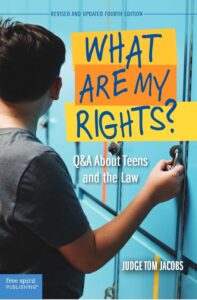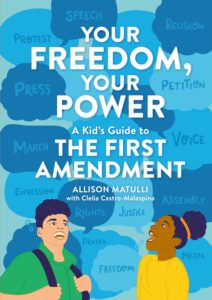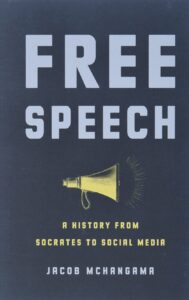Teens, you have constitutional rights. And not just the right to remain silent (although this is a useful one that many teenagers have invoked since the Fifth Amendment was ratified in 1791…haha). Understanding exactly what your freedoms are can be confusing, but let me affirm the United States’ Bill of Rights are not exclusive to adults…they protect you too. How do I know? I read some books about it!
 “What Are My Rights? Q&A about Teens and the Law” by Judge Tom Jacobs is my new obsession. This Young Adult (YA) nonfiction book answers so many interesting and nuanced legal questions…things like “Can my property be searched and seized?”; “Do I have complete freedom of expression in school?”; “Can I be prosecuted for comments I make online?”; and “What are my rights as a lesbian, gay, bisexual, or transgender teenager?” I’m telling you; you will be hooked. This book is easy to jump around in…just read the table of contents and flip to the topics that interest you. It’s written by a judge who knows his way around the law, and he explains complex things in a way that makes readers feel like we can find our way around too. Read it and feel confident leveraging your rights…and better understanding their potential limits.
“What Are My Rights? Q&A about Teens and the Law” by Judge Tom Jacobs is my new obsession. This Young Adult (YA) nonfiction book answers so many interesting and nuanced legal questions…things like “Can my property be searched and seized?”; “Do I have complete freedom of expression in school?”; “Can I be prosecuted for comments I make online?”; and “What are my rights as a lesbian, gay, bisexual, or transgender teenager?” I’m telling you; you will be hooked. This book is easy to jump around in…just read the table of contents and flip to the topics that interest you. It’s written by a judge who knows his way around the law, and he explains complex things in a way that makes readers feel like we can find our way around too. Read it and feel confident leveraging your rights…and better understanding their potential limits.
 I wanted to know more about teenagers’ First Amendment Rights specifically, so I read on. “Your Freedom, Your Power: A Kid’s Guide to the First Amendment” by Allison Matulli with Clelia Castro-Malaspina can be found in the children’s nonfiction section, and it’s an absolute heavy hitter when it comes to figuring out your freedom of expression. Again, it’s organized in a way that makes it easy to jump around to the sections that interest you most. Want to know more about book banning in public schools? Prayer in the classroom? Your HAIR (and if your principal can dictate how you style it)? All of these topics and more are covered in this book, which will leave you feeling empowered and prepared to defend your liberties (and your mullet).
I wanted to know more about teenagers’ First Amendment Rights specifically, so I read on. “Your Freedom, Your Power: A Kid’s Guide to the First Amendment” by Allison Matulli with Clelia Castro-Malaspina can be found in the children’s nonfiction section, and it’s an absolute heavy hitter when it comes to figuring out your freedom of expression. Again, it’s organized in a way that makes it easy to jump around to the sections that interest you most. Want to know more about book banning in public schools? Prayer in the classroom? Your HAIR (and if your principal can dictate how you style it)? All of these topics and more are covered in this book, which will leave you feeling empowered and prepared to defend your liberties (and your mullet).
 Did I stop there? No, I couldn’t. Reading about rights is addictive. I then turned to some books from the adult nonfiction section, including “Free Speech: A History from Socrates to Social Media” by Jacob Mchangama, “You Can’t Always Say What You Want: The Paradox of Free Speech” by Dennis Baron, and “Guardians of Liberty: Freedom of the Press and the Nature of News” by Linda Barrett Osborne. Among other important things, these books examine the tension between uninhibited discourse and the abuse, misinformation, and hyperbole that can come with it. Free speech carries a weighty price, but could democracy exist without it? Teens, read these books and answer this existential question with me!
Did I stop there? No, I couldn’t. Reading about rights is addictive. I then turned to some books from the adult nonfiction section, including “Free Speech: A History from Socrates to Social Media” by Jacob Mchangama, “You Can’t Always Say What You Want: The Paradox of Free Speech” by Dennis Baron, and “Guardians of Liberty: Freedom of the Press and the Nature of News” by Linda Barrett Osborne. Among other important things, these books examine the tension between uninhibited discourse and the abuse, misinformation, and hyperbole that can come with it. Free speech carries a weighty price, but could democracy exist without it? Teens, read these books and answer this existential question with me!
Something great I learned while immersing myself in these books is that in many instances, it was teenagers themselves who went to court to challenge violations to their constitutional rights, and in the process, really helped the courts define the rights of minors more explicitly, saving other minors from censorship and suppression. Maybe one day I will pick up a new book about teenagers’ rights and you’ll be in it. It will be my new favorite book.
Kristina Naftzger is a Youth Services Librarian at A.K. Smiley Public Library.